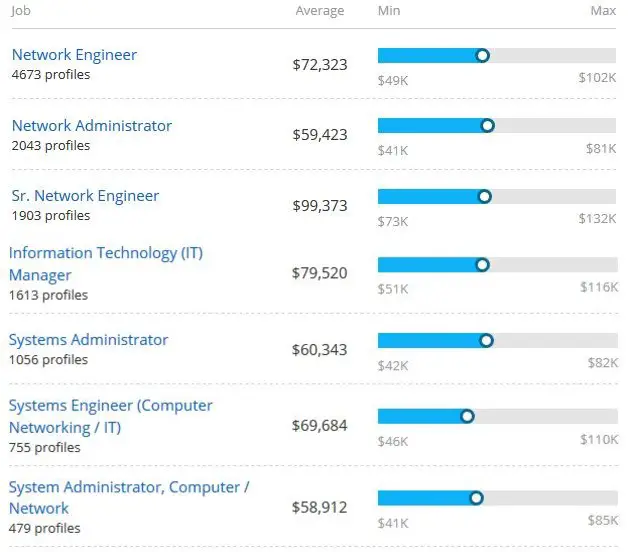How to become a Computer Networking Professional
This article provides in-depth information into What is a Computer Networking Professional? What Computer Networking Professionals do? Degrees for Computer Networking Professionals, Steps to become Computer Networking Professional and much more.
A computer network professional is a person performing duties such as researching and analyzing network plans and make well thought out recommendations upon their results. A computer network professional works with software as well as hardware to provide optimum business performance. Network professionals also provide user support, troubleshoot, and diagnose issues within the network. The article aims at detailing the important aspects of becoming a computer network professional,
The steps to follow to become a computer network professional are as follows,
- Earn a bachelor's degree
- Gain experience in the IT field
- Choose your career path in the Networking field
- Gain specializations
- Work as a network administrator
- Aim at an advanced degree
Further details you need to understand are,
|
Career Title |
Computer Networking Professional |
|
Degree Requirements |
Bachelor’s degree |
|
Job Growth |
5% |
|
Experience required |
1 year |
|
Salary (2020) |
$53,689 |
|
How long to become a Computer Networking Professional |
4 years |
|
Required Skills |
Problem-solving, communication, analytical thinking, multitasking |
What does a Computer Networking Professional do ?
Computer network professionals work in Information Technology (IT) specific industries. The job role of a computer network professional includes a wide range of responsibilities such as:
-
A computer network professional analyses, develop and evaluate systems and specifications of computer systems
-
They also evaluate network operations, software, hardware and systems and provide suggestions for improvements
-
Create procedures for network inventory
- The main role of this professional is to diagnose and find resolutions for network faults
-
They continuously monitor traffic and activity for integrity and optimum performance
-
Provide maintenance for networks
-
Provide specific network programming for individual companies
-
They do research and also monitor the infrastructure of networks for optimal performance
-
Troubleshoot network issues and provide support and solutions
Steps for becoming a Computer Networking Professional
1
Earn A High School Diploma
A bachelor's degree in computer network professional offers programs that provide an overview of standard industry networking tools and procedures for resolving problems within computer networks. Course-work includes an operating system, programming essentials, network administration and information security.

2
Work As A Network Administrator
Network administrators typically focus on installing, maintaining, and monitoring the performance of networks, and also manage IT support authorities, as well as support engineers in the network design development.

3
Consider Earning A Graduate Degree
Network engineers who have a graduate degree have employment favors in a wider range. A graduate program usually consists of 2 years duration and focus on combined instruction in business topics with instruction in IT concepts. Coursework includes classes in wireless networking, telecommunications design, and Internet protocols.

Computer Networking Professional Degree Levels
Associate
An associate degree highlights the procedures and skills that are used to install, operate and repair computer networks. Students get standard classroom instruction, as well as work directly with computer technology in representative settings. Students also learn about computer network issues such as set up, test and troubleshoot.
Programming languages
-
Java
-
Python
-
Ruby
Objectives
-
Functional programming
-
How to use language constructs effectively
-
How to design correct and elegant programs
Subject description
-
Error handling
-
File utilities
-
Process management
Objectives
-
Various operating system tasks
-
Operating system design
-
Interactions with networking
Subject description
-
jQuery
-
CSS
-
HTML
Objectives
-
Write syntactically correct HTML5 and CSS3
-
Create interactive web experiences with JavaScript
-
Develop high-quality websites
Bachelors
Bachelors degree focuses on networking topics such as creating and operating links between computers. The course-work include creation and service a wired network (connection-oriented) and virtual networks (connectionless). Students are subjected to a combination of classroom instruction and practical experience.
Computer architecture
-
Functionality of computer
-
Implementation of a computer
-
Programming model
Objectives
-
Basic Structure of Components
-
Embedded Systems
-
Input/Output Organisation
Microprocessor design
-
Microprocessor creation
-
ASCII design
-
Digital circuits
Objectives
-
Using Digital Circuits
-
Introduction to microprocessor design
-
Microprocessor Components
Database design
-
Data model
-
Storage parameters
-
Database Management System
Objectives
-
Features of a Relational Database
-
To construct a conceptual model
-
To normalize a database
Masters
Master’s degree in computer engineering is designed either for those who want to pursue higher studies or those that want a career advancement. Depending on the student’s professional and educational goals, there are two programs at master’s degree level to choose from - Master of Science in Computer Engineering or a Master of Engineering in Computer Engineering.
While master’s of science is a research based program requiring students to complete independent research that culminates with a thesis project, master’s of engineering is a professionally focused program aiming to allow students opportunities of exploring professional interests both within and outside the field of computer engineering. Master’s degree typically requires 30 to 33 credit hours which is equivalent to two years of full time study to be completed successfully and allows students to concentrate their program in specialized areas like hardware and computer architecture, software,cyber security, computer communications and networks to name a few.
Information theory
-
Storage of information
-
Communication of information
-
Manipulation of information
Objectives
-
Quantitative measures of information
-
Data compression
-
Statistical signal processing
Subject description
-
Properties of code
-
Data compression
-
Introduction to cryptography
Objectives
-
Using code to perform various operation
-
Basic concepts of information theory
-
Channel and channel capacity
Methods of optimization
-
Memetic algorithm
-
Differential evolution
-
Evolutionary algorithms
Objectives
-
Validate convexity of functions
-
Solve small optimization problems
-
Explain the underlying principles and limitations
